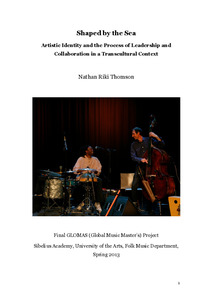Shaped by the sea : artistic identity and the process of collaboration in a transcultural context
Thomson, Nathan Riki (2014)
Thomson, Nathan Riki
[N. Thomson]
2014
Tutkielma
musiikkikasvatus
Julkaisun pysyvä osoite on
https://urn.fi/URN:NBN:fi-fe2014101545202
https://urn.fi/URN:NBN:fi-fe2014101545202
Tiivistelmä
How do musicians from diverse cultural and musical backgrounds find effective ways of working together that successfully result in transcultural collaboration and the creation of new work? What are the most effective ways of leading / facilitating this process whilst maintaining one's own artistic identity?
The aim of this thesis is to document and analyse the process of working together with a diverse group of musicians from different cultural and musical backgrounds, with the aim of researching the art of leadership and collaboration in a transcultural context.
Collaboration in this context is defined as a process in which artists work together equally to exchange ideas and create new work, under the guidance of a leader. I, Nathan Riki Thomson was the project leader, facilitating the collaboration through the vehicle of my own compositions. The participants included musicians from Australia, Brazil, Colombia, Finland and Wales. The project was implemented in three phases, and resulted in a series of concerts and workshops in Finland and the UK, as well as a CD release.
Although the practical outcomes of the project have been documented and are included as part of this thesis, the main focus of this paper is to analyse the process of working together, with an emphasis on observing the group dynamic and interaction between musicians, as well as reflecting on the techniques used to facilitate the collaboration, and the essential skills required to make it a success. This collaboration thereby forms the basis of practice led research into working methods involving musicians from more than one cultural background and musical tradition. Key concepts are identified, such as collaborative learning, shared meaning within a transcultural context, leadership, engagement, and tacit knowledge.
A second area of focus is on the search for my own artistic identity, with reflections on my cultural heritage, homeland, ancestry, travels, migration and transcultural arts practice. Observations are made about my time spent living in Africa, and from my perspective as an Australian born musician and composer, I ponder questions of cultural identity and musical expression, and the search for artistic identity within a transcultural context.
Conclusions are made about specific skills and core elements, which are regarded as being essential for a successful transcultural collaboration. These include tolerance; honesty; compassion; integrity; sincerity; authenticity; interpersonal skills; leadership and collaborative skills, and the cultivation of shared ownership and shared meaning.
Final reflections are made about the key concepts identified, looking ahead to the development of these concepts through further research in the future.
The aim of this thesis is to document and analyse the process of working together with a diverse group of musicians from different cultural and musical backgrounds, with the aim of researching the art of leadership and collaboration in a transcultural context.
Collaboration in this context is defined as a process in which artists work together equally to exchange ideas and create new work, under the guidance of a leader. I, Nathan Riki Thomson was the project leader, facilitating the collaboration through the vehicle of my own compositions. The participants included musicians from Australia, Brazil, Colombia, Finland and Wales. The project was implemented in three phases, and resulted in a series of concerts and workshops in Finland and the UK, as well as a CD release.
Although the practical outcomes of the project have been documented and are included as part of this thesis, the main focus of this paper is to analyse the process of working together, with an emphasis on observing the group dynamic and interaction between musicians, as well as reflecting on the techniques used to facilitate the collaboration, and the essential skills required to make it a success. This collaboration thereby forms the basis of practice led research into working methods involving musicians from more than one cultural background and musical tradition. Key concepts are identified, such as collaborative learning, shared meaning within a transcultural context, leadership, engagement, and tacit knowledge.
A second area of focus is on the search for my own artistic identity, with reflections on my cultural heritage, homeland, ancestry, travels, migration and transcultural arts practice. Observations are made about my time spent living in Africa, and from my perspective as an Australian born musician and composer, I ponder questions of cultural identity and musical expression, and the search for artistic identity within a transcultural context.
Conclusions are made about specific skills and core elements, which are regarded as being essential for a successful transcultural collaboration. These include tolerance; honesty; compassion; integrity; sincerity; authenticity; interpersonal skills; leadership and collaborative skills, and the cultivation of shared ownership and shared meaning.
Final reflections are made about the key concepts identified, looking ahead to the development of these concepts through further research in the future.
Kokoelmat
- Kirjalliset opinnäytteet [1403]
